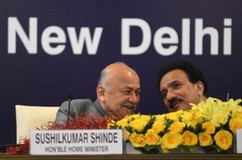
New Delhi, December 15: Pakistani interior minister Rehman Malik dealt a blow to the efforts to normalize bilateral ties by raking up the Babri issue and seeking to draw a parallel between destruction of the mosque and terror attacks including the 26/11 carnage in Mumbai.
"We don't want any 9/11, we don't want any Mumbai bomb blast (attacks), we don't want any Samjhauta Express blast and we don't want Babri masjid issue," Malik said, stunning his hosts into silence and souring the positive vibes over the new visa regime designed to facilitate travel between the two countries.
Although he concluded by saying that he wanted to work for peace between the two countries and in the entire region, his reference to Babri was seen as a provocation. This was the first instance that a visiting Pakistani dignitary had waded into the sensitive Babri issue.
Malik was speaking impromptu after he, along with home minister Sushil Kumar Shinde, had launched the liberalized visa regime as part of the painstaking effort to repair the relationship mauled by the ISI-backed Lashkar gang who ravaged Mumbai in November 2008.
The foreign ministry had reservations about having Malik over at this juncture, and his conduct may validate the misgivings. He twice cited killing of Pakistani citizens in Samjhauta blast almost as a counterpoise to the terrorist attack on Mumbai, besides, predictably, rejecting India's argument that it had given enough material to Pakistan to act against Lashkar chief Hafiz Saeed.
Reacting to his comments, former Indian high commissioner to Pakistan G Parthasarthy said, "This shows the folly of inviting a Pakistani leader without any political standing who would only try to appease domestic opinion and the army."
The remarks Malik made earlier, at the airport on his arrival, on Captain Saurabh Kalia of Indian Army could also have been better framed. Kalia was tortured and his body mutilated after he was abducted and killed by Pakistani troops during the Kargil war in May 1999. Malik's arrival coincided with the Supreme Court issuing a notice to the Centre on a petition by Kalia's father that Pakistan be tried in the International Court of Justice for violation of Vienna rules on the humanitarian treatment of prisoners of war.
Asked about it, Malik started alright. He pleaded ignorance of the facts of the case but said he would be happy to meet Kalia's father. "Whenever any human being dies nobody hesitates to say sorry for that," he said. However, Malik went on to add that he was not aware whether Kalia died of a Pakistani bullet or just fell victim to harsh weather: a formulation which seemed insensitive considering the tell-tale marks of torture on Kalia's body.
The Pakistani minister said his government wanted to work on improving bilateral ties and even suggested that India should move beyond 26/11, asserting that "Pakistan will leave no stone unturned to punish those involved in the Mumbai terror attack". He further said, "We can work together not only for peace in Pakistan and India but also for the region."
Malik's remarks are not a happy augury for the patient fence-mending the two countries have been engaged in. In fact, his hosts in the home ministry looked distinctly awkward and the atmospherics tense as Malik spoke.
Shinde, who appeared to have been caught unawares, gathered his nerves to tell Malik that Pakistan needed to make good its promise to bring to book the 26/11 masterminds, stressing that it has not been fulfilled yet. "You have been outspoken on all fronts. But we in India keep on talking that earlier on several occasions, the promises were made and that (they) were not fulfilled. Today, you have made the promise again. I am quite confident that both the countries will go forward in bilateral cooperation," he said.
Importantly, however, Malik made it plain that India could not expect any concessions from Pakistan on the issue of its failure to punish Lashkar chief Saeed and other 26/11 masterminds. He cited three court orders exonerating Saeed. He said Pakistan could not go by just the statement of Ajmal Kasab or India's dossier on the Laskhar chief, ignoring India's contention that it had given enough material to Pakistan to probe Saeed's role.
He spoke of propaganda, blamed the tension between the neighbours on non-state actors and tried to draw equivalence between Saeed and the killing of Pakistani nationals in the bomb attack on Samjhauta Express. "I have been receiving dossiers with only information," Malik said at the airport, echoing Pakistan's charge that India has given no evidence on Saeed's complicity in the attack on Mumbai.
He continued in the same vein when he addressed reporters after inaugurating the new visa regime. "I know there have been questions on Hafiz Saeed and obviously this is the demand from the people of India. Exactly in the same way, when the Samjhauta blast happened, people of Pakistan were actually asking what had happened," he said.








Comments
Add new comment